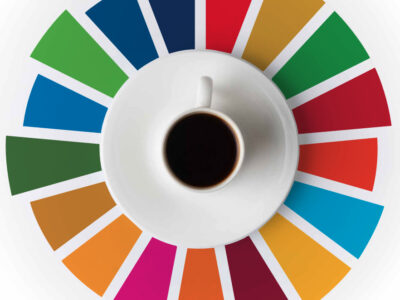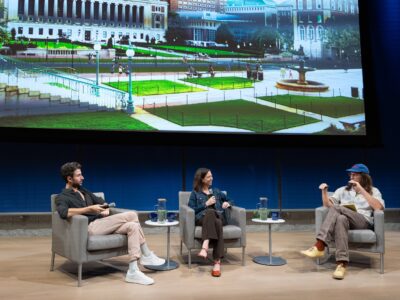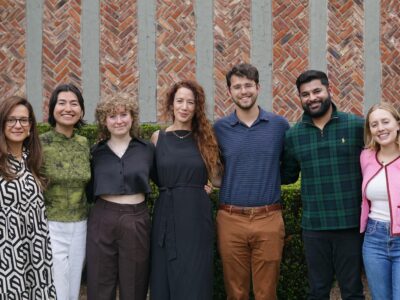From heads of state to ordinary citizens, thousands of people will gather for more than 100 events during Climate Week NYC. They’ll be talking and debating the rights of nature, corporate leadership, the threat from rising seas, innovations for social good and innumerable other topics. The activities in and around Climate Week — officially Sept. 22-28 — are meant to engage people in tackling the problems posed by worldwide climate change, and to encourage leaders to take concrete steps toward finding solutions.

The Earth Institute and its centers will be engaged in several events:
The International Conference on Sustainable Development Practice runs Sept. 17 and 18 at Columbia University (check the link for details, as registration and a fee are required). The conference, held by the Global Association of Master’s in Development Practice Programs in collaboration with the Sustainable Development Solutions Network (SDSN), hopes to share and identify practical, evidence-based solutions that can inform the SDSN leadership in shaping the post-2015 agenda.
Keynote speakers will include Bineta Diop of Femmes Africa Solidarité, Frannie Leautier of Mkoba Private Equity, Earth Institute Director Jeffrey D. Sachs and Erik Solheim from the OECD Development Assistance Committee.

Climate photos, climate talk: Scientist Peter deMenocal from the Lamont-Doherty Earth Observatory will speak about “What is Climate Science?” on Sept. 22, 3-4:30 p.m., at the International Center for Photography, 1133 Avenue of the Americas (at 43rd Street). Admission is free. The talk comes in conjunction with an exhibit of photographs by Sebastião Salgado, who spent eight years traveling the globe to document the last pristine areas of the planet.
Continuing through mid-December, the center plans a series of events in partnership with the Lamont-Doherty Earth Observatory and the International Research Institute for Climate and Society of The Earth Institute, and The Human Impacts Institute, Brooklyn. That will include “Friday Evenings with Climate Scientists, running 6-7:30 p.m., with free admission. Scientists from Lamont-Doherty and IRI will lead visitors through sections of the Salgado exhibition related to each scientist’s field of study, explaining the climate conditions and environmental threats particular to the geographic regions documented in the photographs.
Communicating climate: Also on Sept. 22, The Center for Research on Environmental Decisions will co-sponsor a breakfast roundtable discussion on “Climate Communication: Lessons from Science and our Communities.” Courtney St. John, associate director of outreach at the center, will join the panel, from 8:30-11 a.m. at The Moderns, 900 Broadway at 20th Street. Other panelists will be George Marshall of the British Climate Outreach and Information Network, touring with his new book: “Don’t Even Think About It: Why Our Brains are Wired to Ignore Climate Change”; and Tara DePorte, founder and executive director of the Human Impacts Institute. Melissa Everett, executive director, Sustainable Hudson Valley, will moderate.
“Intellectual Property and Global Warming: Fossil Fuels and Climate Justice”: The Columbia Center on Sustainable Investment and the Sabin Center for Climate Change Law are co-sponsoring a talk and discussion on Sept. 22 with Matthew Rimmer, an Australian Research Council Future Fellow and associate professor at the Australian National University College of Law. The event runs 12:10-1 p.m. at the Columbia Law School’s Jerome Greene Hall, Room 107. For details look here.

Are humans running out of luck? Professor Ruth DeFries will talk about her new book, “The Big Ratchet: How Humanity Thrives in the Face of Natural Crisis,” at the Italian Academy, Columbia University, on Sept. 23 from 6-7 p.m., with Earth Institute Executive Director Steven Cohen. A reception will follow. Check this link to RSVP for this event. (And you can read a recent interview with DeFries on the State of the Planet.)
Using insurance against weather risks to help farmers and fight poverty: On Sept. 24, the International Research Institute for Climate and Society’s Daniel Osgood will join a panel to explore building innovative and sustainable index-insurance markets for weather-related risks in developing countries. The World Bank’s Global Index Insurance Facility and the IRI are sponsoring the event, which will include speakers from Swiss Re, AXA Insurance, Oxfam, the World Food Programme and other organizations. The event is open and free, but you must register to attend.

A Colloquium on Forests and Climate will be held Sept. 24 at Columbia; Cheryl Palm of the Earth Institute’s Agriculture and Food Security Center and Lisa Goddard, director of the International Research Institute for Climate and Society, are among the speakers, along with John Holdren, the White House science and technology adviser. Speakers will offer their ideas on “how to change the future by challenging the present.” The afternoon event is open and free, but you must register to attend. You can find out more online about what they’re talking about, and the co-sponsor, the Center for International Forestry Research.
This is the sixth year of Climate Week NYC, which is convened by The Climate Group and CDP. For a full list of events, visit the Climate Week NYC site. And you can connect on social media through the #CWNYC hashtag.

Many Climate Week gatherings are by invitation only; some charge admission. But there are many open and free events, most prominently the march on Sept. 21. Participants will gather at Central Park West between 59th and 86th streets; the route winds down around Times Square and ends at 11th Avenue between 34th and 38th streets. For details, visit the march website.
UN Secretary-General Ban Ki-moon called the climate summit Sept. 23 in anticipation of formal negotiations for a global climate agreement scheduled for December 2015 in Paris, through the United Nations Framework Convention on Climate Change. The results of these ongoing negotiations have been disappointing up to now. But many hope the mounting evidence of current and potential damage to ecosystems and economies from climate change will make this round of talks more productive.
The UN summit on Sept. 23 will bring together heads of state and other government officials, and leaders from business and civil society. The aim is to push for new commitments and action to steer the world toward a low-carbon economy, reducing the emissions contributing to global warming and strengthening strategies for adaptation to a changing environment.

“Climate change is not just an issue for the future, it is an urgent issue for today,” Ban Ki-moon said in a recent UN posting. “Instead of asking if we can afford to act, we should be asking what is stopping us, who is stopping us, and why? Let us join forces to push back against skeptics and entrenched interests. Let us support the scientists, economists, entrepreneurs and investors who can persuade government leaders and policy-makers that now is the time for action.”



